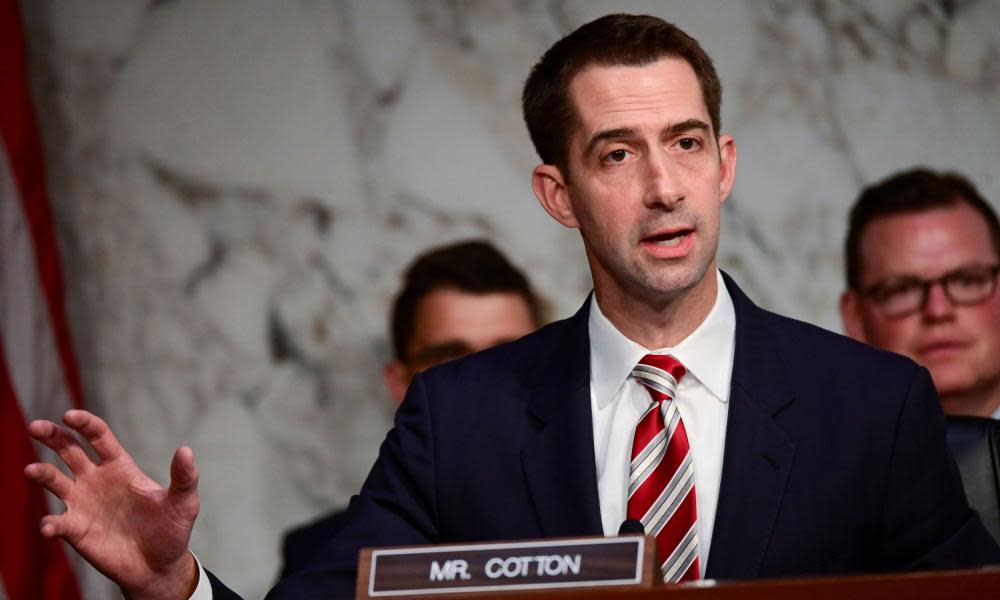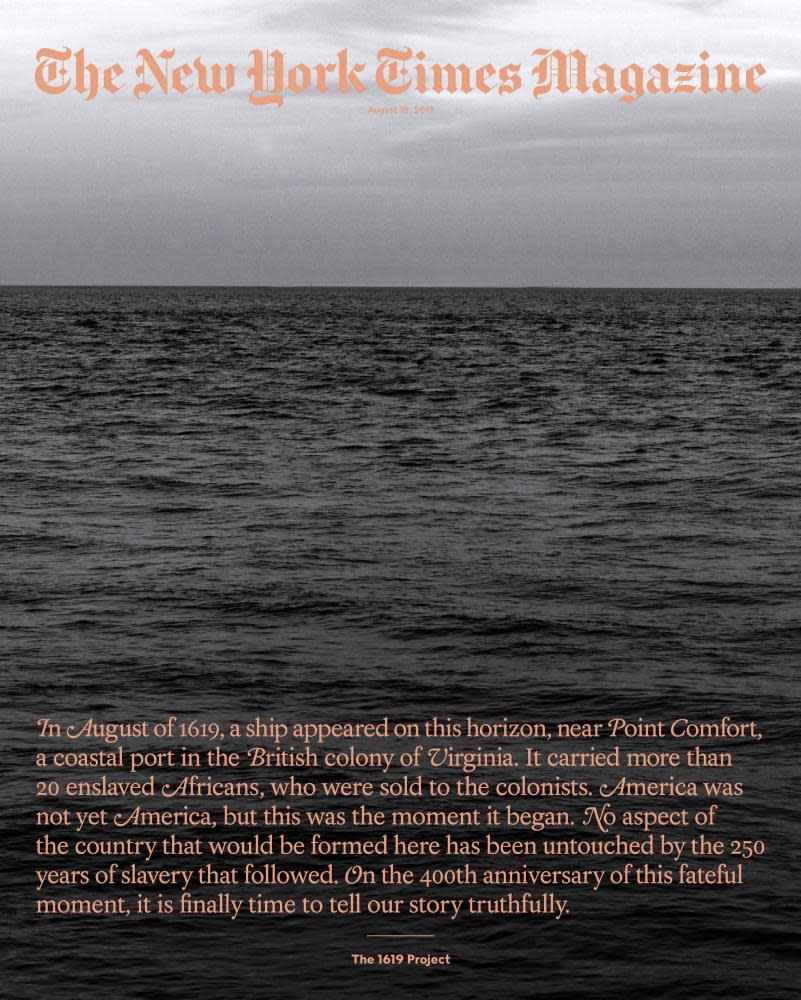Tom Cotton’s war on the 1619 Project is the real 'cancel culture'

Tom Cotton, the Arkansas senator, introduced a bill last week to prohibit federal funds from being used to teach the New York Times’ 1619 Project, which looks at the legacy of slavery in the US, in elementary and secondary schools.
The bill notes that “an activist movement is now gaining momentum to deny or obfuscate [the history of America’s founding] by claiming that America was not founded on the ideals of the Declaration but rather on slavery and oppression.” Cotton later asserted in an interview that “the founding fathers said [slavery]... was the necessary evil upon which the union was built, but the union was built in a way, as [Abraham] Lincoln said, to put slavery on the course to its ultimate extinction”.
Related: Tom Cotton calls slavery 'necessary evil' in attack on New York Times' 1619 Project
So while the founding fathers said the union was “built” on slavery, according to Cotton, he is against the 1619 Project’s position that America was founded on “slavery and oppression”. One could get into the semantic differences between a country “built” on slavery and “founded” on it. But the crux of Cotton’s dispute is that he wants America depicted in a blindingly positive light. This points to a larger issue: conservative resistance to teaching any version of history that upends the myth of American exceptionalism. The power imbalance that has historically censored opposing versions of this mythological America is the real “cancel culture”.
To be clear, some historians across race have taken issue with what they see as inaccuracies in the project. The most contentious claim journalist Nikole Hannah Jones makes in her Pulitzer prize-winning 1619 Project essay is that protecting the brutal institution of slavery was “one of the primary reasons colonists decided to declare their independence from Great Britain”. This portrayal has been challenged by historians. It was also decried by Republicans like Cotton, for whom America was founded on ideals of “life, liberty and the pursuit of happiness”. So who is right? The reality is America was founded on both. And if the 1619 Project’s vehement rightwing critics were paying attention or cared about accuracy as much as they claim, they’d realize Jones acknowledged as much.
Before justifying her argument, Jones states: “the United States is a nation founded on both an ideal and a lie.” Asserting that all men are created equal was a lie, because “one-fifth of the population within the 13 colonies struggled under a brutal system of slavery unlike anything that had existed in the world before”, she continued. This system treated Black people as chattel, and their subjugation was later justified with anti-blackness that has been central to America’s foundation.
In the eyes of conservatives like Cotton, a worldview that challenges his idealization of America is a threat to the country itself
From the colonial era to the antebellum years, those with misgivings about slavery didn’t necessarily believe that Black people were equal. Abraham Lincoln was among those pronouncing the “superior position assigned to the white race”. Whatever motivated some colonists to seek British independence is unrelated to the position that America’s founding document was hypocritical. But conservatives like Cotton aren’t looking for a more precise and accurate accounting of American hypocrisy; instead they prefer we largely avoid interrogating America at all. And anyone or anything that falls out of line must be cancelled and excommunicated from the church of American exceptionalism.
Cotton’s bill and accompanying rhetoric, wrapped in the zealous alarm of a religious fundamentalist, give this away. The Project, the bill claims, “threatens the integrity of the Union”, and is revisionist history “at its worst”. If passed, teaching the 1619 Project will cost school districts professional development funds and lower other federal funding to make up for costs associated with “planning time and teaching time” of the Project’s curriculum. It is unclear if this refers to teaching any one of the essays or other creative works of the Project or the entire teaching guide offered by the Pulitzer Center. But censoring the whole Project with a blunt cudgel, instead of addressing its advantages and specific weaknesses, is the point.

In the eyes of conservatives like Cotton, a worldview that challenges his idealization of America is a threat to the country itself. I mean, think about the children! How dare we indoctrinate them with propaganda, as if the propaganda of American exceptionalism has not been central to US K-12 education.
This hyperbole undermines what could be a nuanced discussion of the various principles and practices that have guided the country, including a class analysis that examines distinctions between America’s white, land-owning planter class and everyone else – those enslaved, indentured and colonized across race whose labor and land, in the case of the indigenous, were exploited to advance capitalism.
Beyond that, the bill’s extreme measures belie Republican rhetoric about censorship and “states’ rights”, and they point to the privilege of one version of America – one that upholds American exceptionalism like religious dogma – dominating our curriculum. It is a privilege that allows some powerful white men, from slave-owning founding fathers to senators like Cotton, to depict slavery as in any way necessary and pushback as heretical. And it’s not just obscene for kids; think of the crucifixion of marginalized conservatives targeted by America’s growing “activist movement”. First they come for our Confederate statues and now our warped slavery-justifying bubble, the horror! What’s next? A critique of capitalism? Imperialism? Police?
The Black Lives Matter movement is surely only catalyzing this alarmism, with Cotton’s bill explicitly acknowledging activists’ “growing momentum”. Many conservatives cannot reasonably grapple with increasing radicalism unsatisfied with mere reform and evocation of ideals of American equality. With abolitionist scholars drawing an “unbroken line” from slavery to current policing, to national protests spotlighting the concurrent crises of systemically racist economic and public health systems, America is at a tipping point.
Tom Cotton’s legislation is another example of the same old guard of the Grand Old Party seeking to tip the scales where conservatives have historically weighted them – in the hands of the powerful, white and well-off – and cancelling those who challenge them. Meanwhile, much of the country simply wants equality. And a first step towards actually achieving the ideals its founders’ promised is exposing the fullness of America – its hypocritical promises and oppression among them – in schools and on the streets. Nothing could be more patriotic.
Malaika Jabali is a public policy attorney, activist and Guardian US columnist

